- Kenmore refrigerator water filters
- Whirlpool refrigerator water filters
- Samsung refrigerator water filters
- GE refrigerator water filters
- LG refrigerator water filters
- Frigidaire refrigerator water filters
- KitchenAid refrigerator water filters
- Maytag refrigerator water filters
- Kenmore Elite refrigerator water filters
- Estate refrigerator water filters
- GE Profile refrigerator water filters
- Amana refrigerator water filters
- Bosch refrigerator water filters
- Dacor refrigerator water filters
- Electrolux refrigerator water filters
How to rebuild a snowblower carburetor
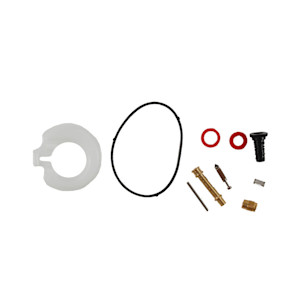
This DIY step-by-step repair guide shows how to remove and rebuild the carburetor on your snowblower. The carburetor controls the air and fuel mixture to the engine. If the engine won't start or shut offs just after starting, then the carburetor could be the problem. Rebuild the carburetor with manufacturer-approved snowblower replacement parts using the steps in this guide.
Use these basic steps to rebuild the carburetor on Craftsman, MTD, Troybilt, Husqvarna, Toro, Murray, Noma and Snapper snowblowers.
Quick links
Video
Instructions
Tools required
Phillips screwdriver
Slot screwdriver
Needle-nose pliers
Socket and ratchet set
Work gloves
Repair difficulty
Time required
45 minutes or less
Repair difficulty
Time required
45 minutes or less
Rebuilding a carburetor on a snowblower
This video explains how to rebuild a carburetor on a snowblower.
Instructions
- 01.
Disconnect the spark plug wire
Pull the spark plug wire up and off the plug.
- 02.
Remove the electric starter switch
Remove the mounting screws and pull the starter switch off the bracket.
Let the starter switch hang by the electrical cord.
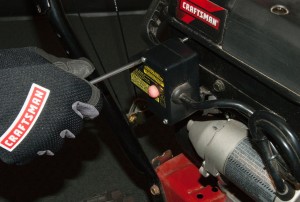
PHOTO: Remove the electric starter switch.
- 03.
Remove the engine shroud
Remove the key.
Pull off the choke and throttle knobs.
Remove the acorn nuts that secure the carburetor to the engine.
Remove the muffler heat shield mounting screws.
Work the engine shroud off the carburetor mounting studs.
Disconnect the primer hose and stop switch wires.
Remove the engine shroud.

PHOTO: Remove the key.

PHOTO: Pull off the throttle knob.
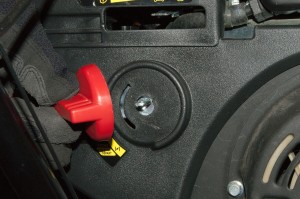
PHOTO: Remove the choke knob.
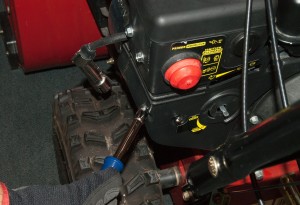
PHOTO: Remove the acorn nuts.
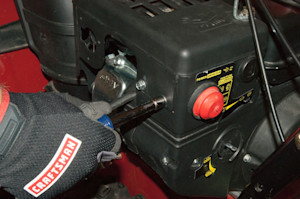
PHOTO: Remove the muffler shroud screws.
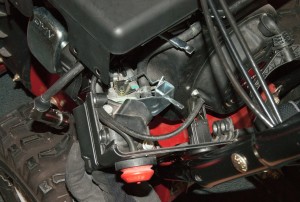
PHOTO: Pull out the engine shroud.
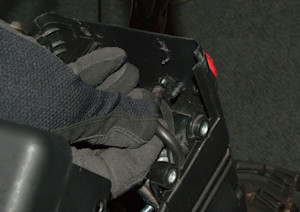
PHOTO: Disconnect the primer hose.
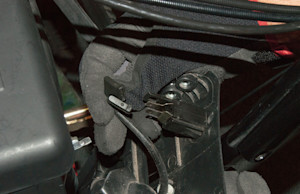
PHOTO: Disconnect the stop switch wires.
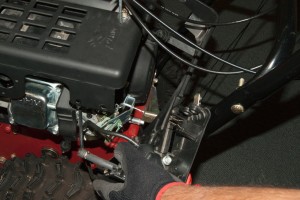
PHOTO: Remove the engine shroud.
- 04.
Remove the carburetor
Release the hose clamp and pull the fuel line off the carburetor.
Slide the choke control plate off the carburetor mounting studs and disconnect the choke linkage from the control plate and carburetor.
Disconnect the throttle rod return spring and remove the throttle rod from the carburetor.
Slide the carburetor off the threaded mounting posts.
Place the carburetor on a clean work surface.
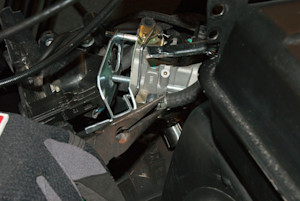
PHOTO: Release the fuel line clamp.
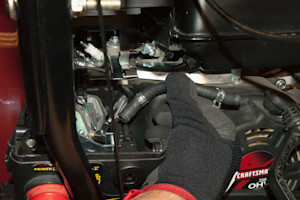
PHOTO: Pull off the fuel line.
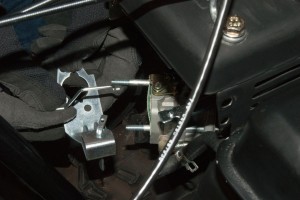
PHOTO: Remove the choke control plate.
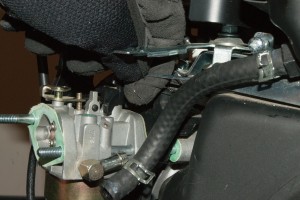
PHOTO: Disconnect the throttle rod and throttle rod return spring.
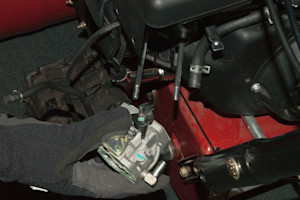
PHOTO: Remove the carburetor from the snowblower engine.
- 05.
Disassemble the carburetor
Remove the fuel bowl mounting nut.
Pull off the carburetor fuel bowl and gasket.
Slide the float pin out and remove the float and float valve.
Unscrew the main jet.
Dump the main jet and emulsion tube out of the central column.
Remove the plastic throttle stop and then pry the plastic metering plug out of the carburetor.
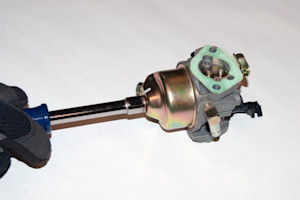
PHOTO: Remove the fuel bowl nut.
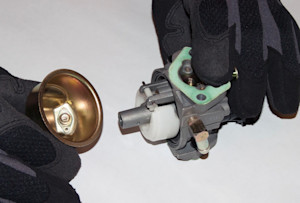
PHOTO: Remove the fuel bowl.
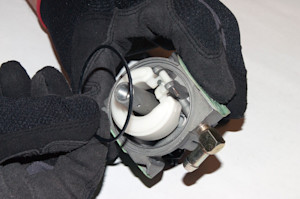
PHOTO: Remove the fuel bowl gasket.
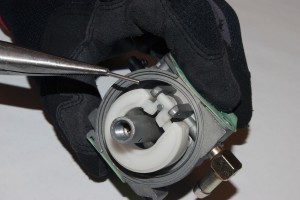
PHOTO: Remove the float pin.
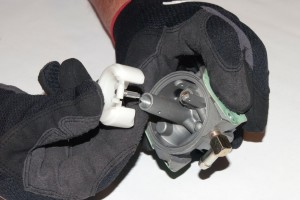
PHOTO: Remove the float and float valve.
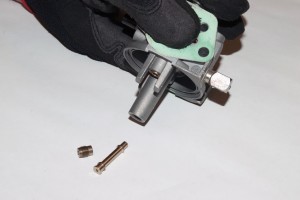
PHOTO: Dump the main jet and emulsion tube out of the central column.
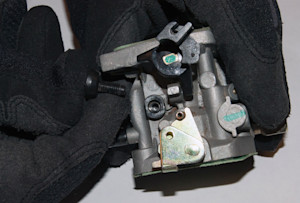
PHOTO: Remove the throttle stop screw.
- 06.
Clean the carburetor
Spray carburetor cleaner into the carburetor body, fuel bowl and all of the small brass orifices in the carburetor.
Wipe the carburetor and fuel bowl clean with a clean shop towel.
Be sure that all the brass orifices are clear of debris and varnish.
Tip: Replace the carburetor assembly If extensive corrosion is evident or if the varnish too extensive to clean.Warning: Never run a wire through any brass orifices to clear varnish or debris. That will damage them and ruin the carburetor.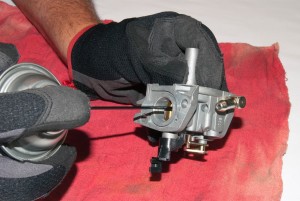
PHOTO: Clean the carburetor.
- 07.
Rebuild the carburetor
Place the new emulsion tube in the central column with the flat end facing the carburetor bowl.
Reinstall the new main jet in the central column and tighten.
Push in the new metering plug until fully seated.
Reinstall the throttle stop screw. Thread it in until the throttle stop screw protrudes out the other side about 1/16-inch.
Insert the new spring on the new float valve and snap the new float valve into the new float.
Attach the new float to the carburetor using the new mounting pin.
Place the new bowl gasket in the channel on the carburetor body.
Reinstall the bowl on the carburetor using the mounting nut. Tighten the bowl nut firmly.
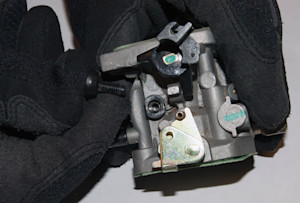
PHOTO: Reinstall the throttle stop screw.
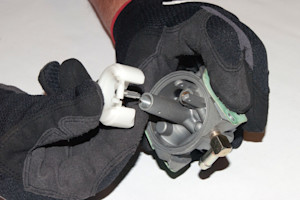
PHOTO: Attach the float.
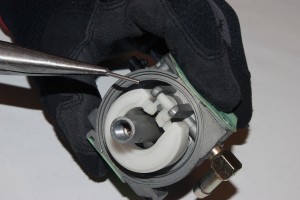
PHOTO: Install the float mounting pin.
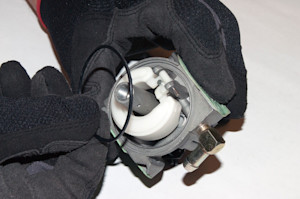
PHOTO: Install the bowl gasket.
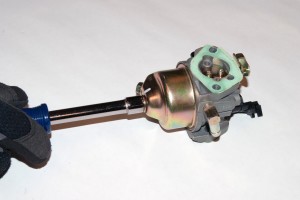
PHOTO: Reinstall the bowl.
- 08.
Reinstall the carburetor
Install the inner carburetor gasket on the mounting posts.
Slide the carburetor onto the 2 mounting posts.
Reconnect the fuel hose to the carburetor and secure it using the hose clamp.
Reattach the throttle rod and throttle rod return spring to the carburetor.
Install the outer carburetor gasket.
Reconnect the choke push rod to the carburetor choke lever.
Reconnect the other end of the choke push rod to the choke control plate lever. Slide the choke control plate over the 2 mounting posts and install the gasket.
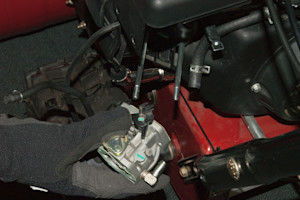
PHOTO: Install the carburetor.
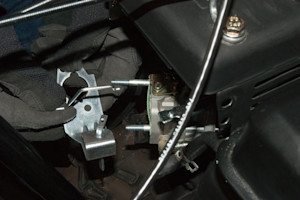
PHOTO: Reinstall the choke control plate.
- 09.
Reinstall the engine shroud
Pull off the muffler shroud before reinstalling the engine shroud.
Remove the belt cover mounting bolts and pull off the belt cover.
Remove the bolts from the red chute support bracket and pull the support bracket forward, releasing the control rod from the 4-way control rod receiver.
Remove the front muffler shroud mounting bolts.
Release the wire control cables from the retainer clip and pull off the muffler shroud.
Reconnect the stop switch wires.
Reconnect the primer hose to the carburetor.
Align the choke knob shaft and the 2 carburetor mounting posts with the openings on the engine shroud and work the engine shroud onto the engine. Make sure that the breather hose passes through the opening and lines up with the rocker cover breather hose fitting.
Slide the breather hose over the rocker cover fitting and secure the hose with the clamp.
Reinstall the 2 acorn nuts to secure the engine shroud to the engine.
Slide the wire control cables into the retainer clip and position the muffler shroud on the engine.
Reinstall the muffler shroud mounting bolts.
Push the control rod back into the 4-way control rod receiver and line up the support bracket with the mounting holes.
Reinstall the bolts in the red chute support bracket.
Reinstall the belt cover using the mounting bolts.
Reinstall the choke and throttle knobs.
Tip: Removing the muffler shroud is necessary because the engine shroud fits under the bottom lip of the muffler shroud. You can remove the engine shroud without removing the muffler shroud but the muffler shroud must be removed for reassembly.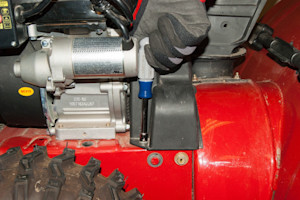
PHOTO: Remove the belt cover bolts.
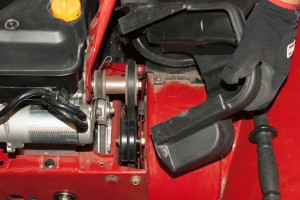
PHOTO: Remove the belt cover.
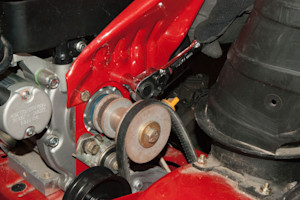
PHOTO: Remove the chute support bolts.
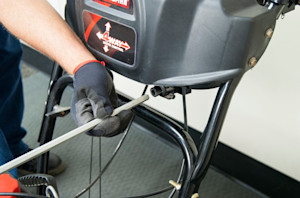
PHOTO: Release the control rod.
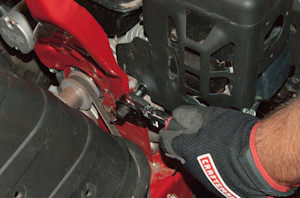
PHOTO: Remove the muffler shroud bolts.
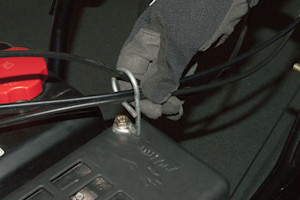
PHOTO: Release the control cable.
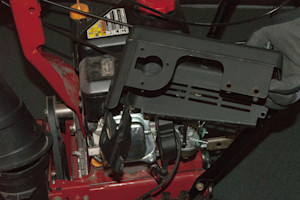
PHOTO: Remove the muffler shroud.
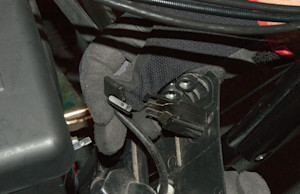
PHOTO: Push the stop switch into the shroud and reconnect the wires.
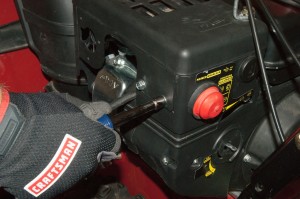
PHOTO: Reinstall the muffler shroud.
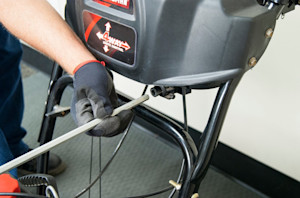
PHOTO: Reinstall the control rod.
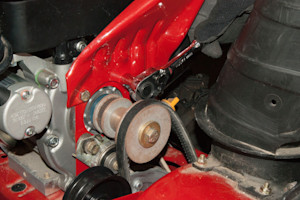
PHOTO: Reinstall the chute support bracket.
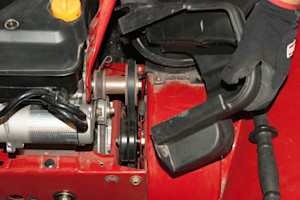
PHOTO: Reinstall the belt cover.
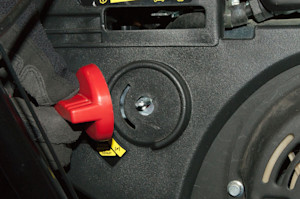
PHOTO: Reinstall the choke knob.
- 10.
Reinstall the electric starter switch
Position the electric starter switch on the switch bracket and reinstall the mounting screws.
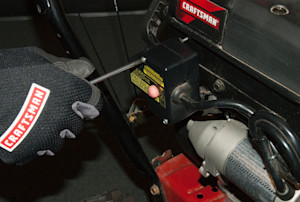
PHOTO: Reinstall the starter switch.
- 11.
Reconnect the spark plug
Reconnect the spark plug wire.
- 12.
Reinstall the key
Push the key into the slot.
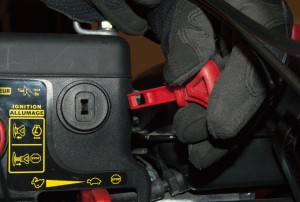
PHOTO: Insert the key.
Warning: Undertaking repairs or maintenance to appliances or power equipment can be hazardous. Should you choose to undertake repairs or maintenance, you are assuming the risk of injury to your person or property. In an effort to reduce the risk, use the proper tools and safety equipment noted in the applicable guide and follow all instructions. Do not proceed until you are confident that you understand all of the steps and are capable of completing the repair. Some repairs or maintenance, however, should only be performed by a qualified technician.
Symptoms for gas snowblowers
Choose a symptom to see related snowblower repairs.
Things to do: replace the spark plug, change the oil, rebuild the carburetor, adjust valve lash, adjust or replace the b…
Main causes: clogged chute, damaged auger blades, broken shear pins, worn auger belt, damaged gear case, engine problems…
Main causes: dirty carburetor, stale fuel…
Main causes: punctured tire, damaged rim…
Main causes: dirty carburetor, clogged fuel filter, dirty spark plug, incorrect valve lash, leaky engine gaskets…
Main causes: stale gas, clogged carburetor, clogged or broken fuel line, dirty spark plug, bad rewind starter, incorrect…
Main causes: loose drive clutch cable, damaged drive clutch cable, worn friction disc, scraper blade scraping the ground…
Main causes: snow build-up in chute, chute drive mechanism failure, bad chute control assembly…
Main causes: clogged chute, snow build-up in auger housing, broken auger shear pins, auger drive belt needs adjustment, …
Repair guides for gas snowblowers
These step-by-step repair guides will help you safely fix what’s broken on your snowblower.
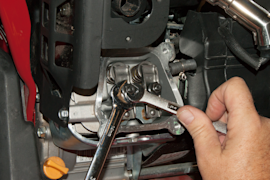
How to adjust snowblower engine valve lash
Adjust the engine valve lash on your snowblower to keep the engine starting and running smoothly.…
Repair difficulty
Time required
15 minutes or less

How to adjust snowblower skid shoes
To prevent snowblower auger and shave plate damage, adjust the skid shoes regularly to keep the shave plate ¼-inch high.…
Repair difficulty
Time required
15 minutes or less
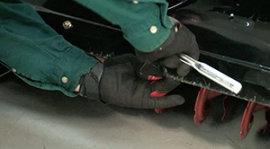
How to replace a snowblower shave plate
Follow the 7 easy steps in this repair guide/video to replace a worn out shave plate on your snowblower.…
Repair difficulty
Time required
15 minutes or less
Effective articles & videos to help repair your snowblowers
Use the advice and tips in these articles and videos to get the most out of your snowblower.
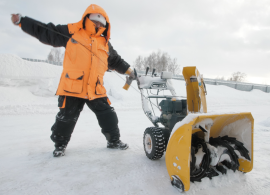
Find easy DIY tips to fix your snowblower when it won't start…
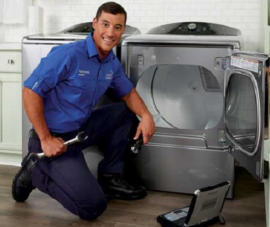
Learn about Sears Technical Institute and the advanced technical content being developed for aspiring appliance techs.…
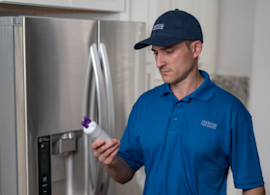
Get answers to frequently asked questions about Sears and Sears PartsDirect.…